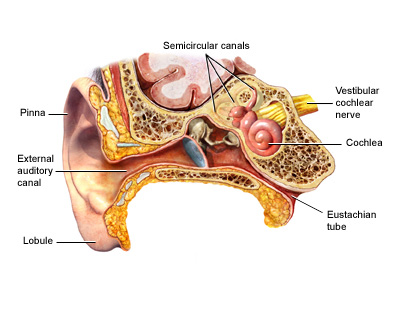Meniere’s disease
Meniere's disease is an inner ear disorder that affects balance and hearing.

Causes
The inner ear contains fluid-filled tubes called semicircular canals, or labyrinths. These canals, along with a nerve in your skull, help interpret your body's position and maintain your balance.
The exact cause of Meniere's disease is unknown. It may occur when the pressure of the fluid in part of the inner ear gets too high.
In some cases, Meniere's disease may be related to:
- Head injury
- Middle or inner ear infection
Other risk factors include:
- Allergies
- Alcohol use
- Family history
- Fatigue
- Recent viral illness
- Respiratory infection
- Smoking
- Stress
- Use of certain medications
Symptoms
Attacks or episodes of Meniere's disease often start without warning. They may occur daily, or as rarely as once a year. The severity of each episode can vary.
Meniere's disease usually has four main symptoms:
- Drop in hearing
- Pressure in the ear
- Ringing or roaring in the affected ear
- Vertigo
Severe vertigo or dizziness is the symptom that causes the most problems. People who have vertigo feel as though they are spinning or moving, or that the world is spinning around them.
- Severe nausea, vomiting, and sweating often occur.
- Symptoms get worse with sudden movement.
- Often, the person will need to lie down.
- The dizziness and feeling of being off-balance will last from about 20 minutes to a few hours.
Hearing loss may occur. Usually the hearing loss is only in one ear, but it may affect both ears.
- A person's hearing tends to recover between attacks but gets worse over time
- Low frequency hearing is lost first
- Roaring or ringing in the ear (tinnitus), as well as a sense of pressure in the ear are common
Other symptoms include:
- Diarrhea
- Headaches
- Pain or discomfort in the abdomen
- Nausea and vomiting
- Uncontrollable eye movements
Exams and tests
A brain and nervous system (neurological) examination may show problems with hearing, balance, or eye movement.
A hearing test or audiogram will show the hearing loss that occurs with Meniere's. Hearing may be near normal after an attack.
A procedure called caloric stimulation tests eye reflexes by warming and cooling the inner ear with water. Abnormal results on this test can be a sign of Meniere's disease.
The following tests may also be done to distinguish Meniere's disease from other causes of vertigo:
- Electrocochleography (ECOG)
- Electronystagmography (ENG) or videonystagmography (VNG)
- Head MRI scan
Treatment
There is no known cure for Meniere's disease. However, lifestyle changes and some treatments can often help relieve symptoms.
Your doctor may suggest ways to decrease the amount of water or fluid in your body. This can often help control symptoms.
- Water pills (diuretics) may help relieve fluid pressure in the inner ear
- A low-salt diet may also help (See: Sodium in diet)
Other changes that may help with the symptoms and keep you safe include:
- Avoid sudden movements, which may worsen symptoms. You may need help walking when you lose balance during attacks.
- Avoid bright lights, TV, and reading during attacks, because they may make symptoms worse. Rest during severe episodes, and slowly increase your activity.
- Avoid activities such as driving, operating heavy machinery, and climbing until 1 week after your symptoms disappear. A sudden dizzy spell during these activities can be dangerous.
- Gradually resume your activity after episodes.
- Keep still and rest when you have symptoms.
Symptoms of Meniere's disease can cause stress. Make healthy lifestyle choices to help you cope:
- Eat a well-balanced, healthy diet. Don't overeat.
- Exercise regularly, if possible.
- Get enough sleep.
- Learn and practice relaxation techniques, such as guided imagery, progressive muscle relaxation, yoga, tai chi, or meditation.
- Limit caffeine and alcohol.
Your health care provider may prescribe medicines for nausea and vomiting. Symptoms such as dizziness and vertigo may respond to sedative/hypnotics and benzodiazepines.
You may need ear surgery if your symptoms are severe and do not respond to other treatments.
- Cutting the vestibular nerve with a surgical procedure helps control vertigo. It does not damage hearing.
- Placing an antibiotic called gentamicin directly into the middle ear can help control vertigo.
- Removing part of the inner ear with a procedure called labyrinthectomy helps with vertigo, but it causes complete hearing loss.
Hearing aids may be needed for severe hearing loss.
Prognosis
The outcome varies. Meniere's disease can often be controlled with treatment.
The condition may get better on its own. However, Meniere's may be chronic or disabling.
Possible complications
- Inability to walk or function due to uncontrollable vertigo
- Hearing loss on the affected side
When to contact a doctor
Call for an appointment with your health care provider if symptoms of Meniere's disease, such as hearing loss, ringing in the ears, or dizziness, occur or worsen.
Prevention
There is no known prevention for Meniere's disease, but prompt treatment of ear infection and other related disorders may be helpful.
Source: http://www.nlm.nih.gov/medlineplus/ency/article/000702.htm
Vomiting (female)


 Общие симптомы
Общие симптомы  Голова, зрение, слух, речь
Голова, зрение, слух, речь  Шея и горло
Шея и горло  Грудь, сердце и дыхание
Грудь, сердце и дыхание  Живот, желудок, кишечник
Живот, желудок, кишечник  Конечности, суставы, спина, поясница
Конечности, суставы, спина, поясница  Таз, мочеполовые органы
Таз, мочеполовые органы  Наружные поверхности, кожа, волосы
Наружные поверхности, кожа, волосы